Featured
Monarch Lauds Exclusion Of Compensation In Ogoni Clean-Up
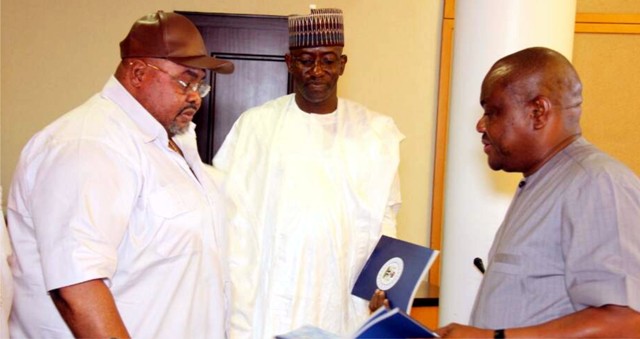
The Chairman, Supreme Council of Ogoni Traditional Rulers, Mene Godwin Gininwa, has commended the United Nations Environment Programme (UNEP) for excluding payment of compensation in its report on Ogoni clean-up, saying it could have ignited a crisis with people killing themselves in the area.
The Gbenemene Tai stated this when he played host to the Hydrocarbon Pollution and Remediation Project (HYPREP), led by the Head, Project Coordination, Dr. Marvin Dekil, during a visit to some communities in Eleme, Tai, Gokana and Khana local government areas to acquaint them of the activities of the body in the clean-up process.
Gininwa said: “One thing I enjoy is that there is no compensation. If there were, we would have killed ourselves. They tied it around projects; give our youth jobs because they will not come for any compensation.”
He urged HYPREP to ensure that it engaged youth, women and men of Ogoni to make up for the non-payment of compensation for destruction in the respective communities to avoid crisis in the execution of its projects.
According to him, “they should put in place machinery to fast track the work. Any bottleneck that is causing the delay should be untied. The Federal Government should make sure that Ogoni people benefit from the project. We will also support HYPREP to ensure that the project succeeds. HYREP should not disappoint Ogoni. I appeal that the Centre of Excellence is built in Tai local government area.”
The visit by the team to communities to sensitise the elders, chiefs, youth groups and women ahead the commencement of remediation of impacted sites has not been without drama, as the different communities lobbied for the siting of the Integrated Contaminated Soil Management Centre (ICSMC) and Centre of Excellence, the two important infrastructures for the clean-up process in their particular areas.
Speaking at the different sensitization venues in Bodo, K-Dere, B-Dere, Ogale, Ebubu, Korokoro and Ueken during the sanitization, Dekil told Ogoni communities that the ICSMC and Centre of Excellence would be built at Bori, the traditional headquarters of Ogoni.
Dekil said the decision was to avoid conflict and war in Ogoni, stating that several communities had written to the Federal Ministry of Environment requesting that the ICSMC be built in their areas.
He stated: “The Integrated Contaminated Soil Management Centre is in Bori to avoid conflict. The past Minister of Environment received different applications on the location of the centre, so she decided to site it in Bori.”
It is the decision of the government.”
Dekil noted that HYPREP would conduct health impact assessment in Ogoni, promising that pipe borne water would also be given priority attention as recommended in the United Nations Environmental Programme (UNEP) report.
“We want to find out whether the sickness in Ogoni came as a result of the different oil spillages that the people have been exposed to.
“Provision of water is top-most in our agenda now. Another aspect concerns health impact assessment, the health impact study will be done by the best hands in the medical field. We will bring international, national bodies and others to do this,” Dekil said.
He said: “We are here to let you know that we are about to start. We are on the scientific stage. You will soon begin to see big equipment in preparation. The soil testing is important because soil will be treated there.”
In his remarks, the Paramount Ruler of Ogale in Eleme Local Government Area, Chief Godwin Bebe Okpabe, had told Dekil: “We have given the Federal Ministry of Environment land for the ICSMC, they did not use it. They told us that HYPREP will correct this, but you have not done it. The community is not pleased that the land we brought out for the ICSMC was abandoned.
“Engage our people in this project, you know what the oil giants do to us you know how they divide and rule us. They will come in and set fire so that the community will not benefit in their projects. You are our son; let’s not exhibit the attitude that will make us lose out from the benefits of the cleanup,” he said.
Also speaking, the Vice Chairman of K-Dere Town Governing Council, Elder Chief Emmanuel Nsah, cautioned: “We do not want disappointment in this project. If we see any disappointment, we will react. When it comes to oil exploration, K-Dere will be remembered, in pollution, we are number one, but when it comes to appointments, we will not be remembered.
“In this community, we experience annual flooding and no electricity yet, we have 54 oil wells. We are not seeking to be number one in the scheme of things, but we need recognition. We want employment to be considered in this community from the apex to the least. If there is any compensation, we should be considered first or second,” he added.
Similarly, Ebubu community demanded training of its youth, men and women for active participation in the clean-up exercise.
The community ruler and Secretary, Rivers State Council of Traditional Rulers, Chief Godwin Chiwi, said: “We are sensitive and emotional to issues of Shell because we have been deeply affected. We are happy about your coming because the implementation is underway.”
He asserted: “If you are coming for testing, for the sake of security, always meet the community rulers. We will not take anything from you, but to save you from hoodlums. We are four communities closely knitted. When you are coming with goodies, do not branch anywhere else, come to us directly.
“When you want to recruit for training, get in touch with our traditional rulers. Make us have a sense of belonging. When you do your water project, we have old facility that has refused to work, check if it is useful. Please, you people should come to our aid, our people are already dying. Some, we do not even know what is causing it,” he stated.
Susan Serekara-Nwikhana
Featured
We’re Genuinely Opening Up Kalabari Land For Development, Says Fubara
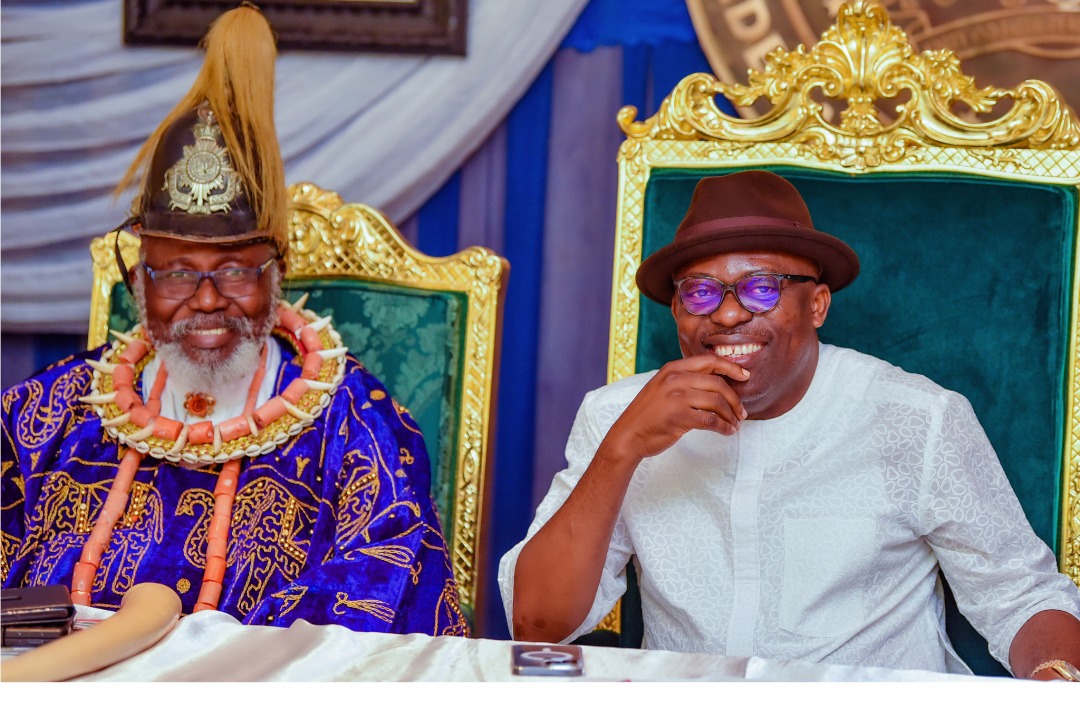
Rivers State Governor, Sir Siminalayi Fubara, has explained that his administration is courageously executing strategic projects that are opening up Kalabari land for unprecedented development and economic growth.
Governor Fubara made the explanation when he received on solidarity visit, a delegation of monarchs, political leaders, elders, women and youths of Kalabari Ethnic Nationality, led by the Amanyanabo of Abonnema, King Disreal Gbobo Bobmanuel, at Banquet Hall of Government House in Port Harcourt, last Tuesday.
The Governor stated that while previous administrations avoided executing the original plan for the Trans-Kalabari Road project due to cost implications, he has ventured into it, and driving the process steadily in order to link Kalabari land to the State capital.
Governor said: “Somebody said, if I don’t do it for my people, who will do it for them. We ventured into the Trans-Kalabari Road, we didn’t close our eyes. Our eyes were open because we knew what we were entering into.
“It is not a joke; it is a big project. We believe that at the end of that project, the level of development that it will attract to that line of entry into Kalabari will be very unprecedented.
“Issues of insecurity from our waterways will be reduced because, at that point we are doing road, people won’t be using the river anymore. The cost of living will also be cheaper.”
Governor Fubara further asserted: “So, you understand that your interest, your safety, your development is key to us. It is not about the number of years that we are going to be here; what is important to this government is the impact we make while we are here.”
Responding to their unanimous endorsement to see him run for a second term in office, Governor Fubara said power belongs to God, and He gives it to whoever finds favour in His sight.
Governor Fubara, however, stated that if God so approved of it, even those who are regrouping against him will not see the path God will lead him because they cannot scuttle such plan.
He added, “Power belongs to God. So, you see, I like believing that we don’t have any problem. When we get to the bridge, we will cross it. If we can break the bridge, Moses will come and create a road for us. So, you don’t need to worry.
“We will cross the bridge. We will cross it in a way that our enemies will be struggling; they won’t see where we are passing. So, don’t worry.”
Governor Fubara acknowledged the immense support to him by Rivers Ijaw, and urged particularly the Kalabari people to stand with honour in their unalloyed support for his administration, which will neither abandon them nor fail to deliver quality projects to the people.
Governor Fubara also responded to their requests and informed them that his administration has completed the Emohua/Tema Junction Road project, and ready to inaugurate the Degema Zonal Hospital in May.
He said the Health Commissioner has been directed to assess the state of the Abonnema General Hospital for immediate rehabilitation, while promising to address the issues of shore protection in the area.
Governor Fubara assured that with the Abonnema sandfilling works completed, the phase two will commence that will include Buguma, explaining that the Commissioner for Works has been tasked to do the assessment immediately.
On the request for the establishment of tertiary institution in the area, Governor Fubara said his administration is already inaudated with memos asking that the off-campus of Rivers State University established previously be revised because it has become difficult to sustain them, but quickly added that the government will consider the establishment of a viable institution that will provide technical and entrepreneurial skills to the people in a sustained manner.
Reading the address of Kalabari Ethnic Nationality, Chief Pawariso Samuel Horsfall, announced that the entire Kalabari people have unanimously endorsed Governor Fubara for a second term, and vowed to mobilise Rivers people to ensure electoral victory for him in the 2027 gubernatorial election.
In his speech, the leader of the delegation and Amanyanabo of Abonnema, King Disreal Gbobo Bobmanuel, expressed the profound thanks of the Kalabari people to Governor Fubara for his genuine love for them, as evidenced in the types and quality of development projects delivered or being executed in the area.
Featured
Senate Passes N54.9trn 2025 Appropriation Bill

The National Assembly, yesterday, passed the N54.9 trillion 2025 Appropriation Bill.
The Tide source reports that this followed the adoption of the report of the Committee on Appropriations on the bill.
The report was presented by Chairman of the Committee, Sen. Solomon Adeola (APC-Ogun).
The Tide source reports that highlights of the passed 2025 appropriation bill indicates an aggregate expenditure of N54.9 trillion, statutory transfers of N3.6 trillion, with recurrent expenditure put at N13.6 trillion.
While the sum of N23.9 trillion was earmarked for capital expenditure, debt servicing was put at N14.3 trillion, fiscal deficit N13.8 trillion, while 1.52 per cent was approved as deficit and GDP.
Olamilekan, while presenting the report, said that the senate debated the general principles of the bill on Dec. 19, 2024.
This, he said, had resulted in the second reading of the bill after which it was referred to his committee for further legislative action.
The senator said that the initial proposal of the executive was N49.7 trillion.
He, however, said while processing the bill, the joint committee on appropriations met the president’s economic team to discuss the revenue projection and expenditure of the appropriation bill.
“After series of meetings, the Committee on Finance, in conjunction with our committee, sourced for additional revenue from some revenue-generating agencies,” he said.
Adeola said that the additional fund was made possible because of the increase in revenue by some of the revenue-generating agencies.
He further stated that some agencies of government provided funds to take care of critical needs.
The lawmaker said that the upward review of the budget from N49.7 trillion to N54.9 trillion was to cater for the difference between the details and the bill, procurement of vaccines and additional funding to some government agencies.
“The joint committee worked harmoniously with the leadership of the National Assembly and the executive arm of government in the processing of the bill.
“This ensured maximum collaboration of the two arms in the utilisation of additional revenue projection.
”This is to improve the funding of some critical projects which could not be adequately funded in the budget proposal earlier submitted by Mr President due to funding constraints,” he said.
Adeola said that the 2025 appropriation bill was presented late as against the 2024 appropriation bill.
He urged the executive to present the budget to national assembly not later than three months before the beginning of the next financial year.
“This will help return the country to the January-December budget circle,” he said.
Featured
CBN Retains N100 ATM Fee For Withdrawal Below N20,000
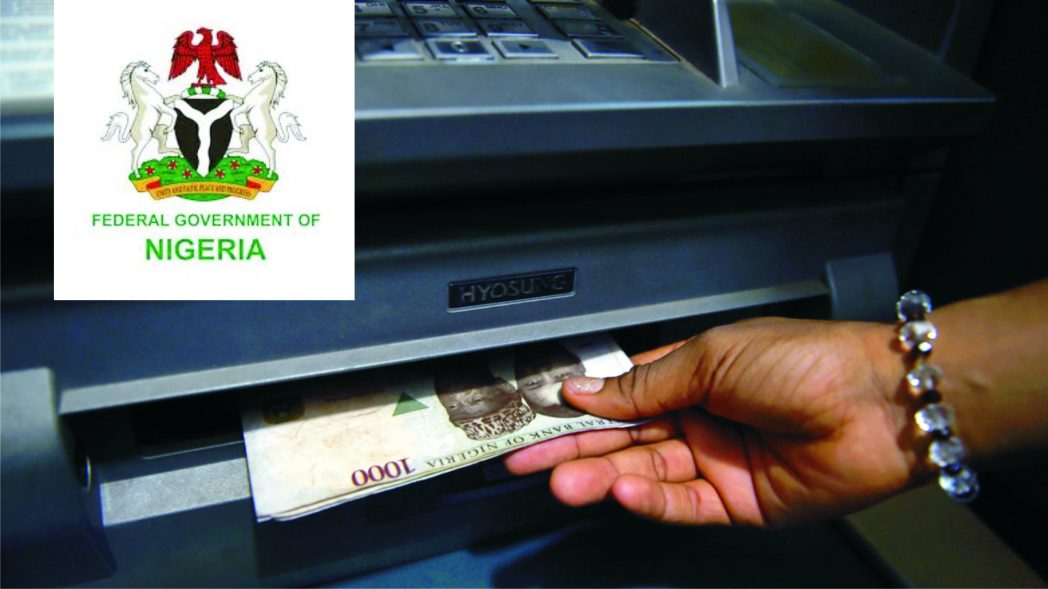
The Central Bank of Nigeria (CBN) has announced that Nigerians withdrawing less than N20,000 from another bank’s Automated Teller Machine will still be charged a fee of N100 per transaction.
This is according to a FAQ document published by the apex bank on its website, yesterday, which provides further information on a new CBN’s directive.
The directive is part of the newly revised ATM transaction fees set to take effect from March 1, 2025, as contained in the CBN circular dated February 10, 2025.
Under the revised fee structure, withdrawals from one’s bank ATMs will remain free of charge.
However, customers using ATMs of other banks will be subjected to a charge of N100 per withdrawal of N20,000 or less at on-site ATMs, which are located within or directly affiliated with a bank branch.
Off-site ATMs, which are positioned outside bank premises such as shopping malls, fuel stations, and other public spaces, will attract an additional surcharge of up to N500 per transaction.
For international ATM withdrawals, charges will be based on cost recovery, meaning customers will bear the exact fee applied by the international acquirer.
The CBN stated that the charge on withdrawals below N20,000 is intended to prevent customers from splitting withdrawals into smaller amounts to avoid fees.
The FAQ document read, “Yes, the fee of N100 will apply if you withdraw less than N20,000 from another bank (a bank other than the one that issued your payment card).
“The reason for applying the fee for every N20,000 withdrawal is to prevent customers from being compelled to break their withdrawals to less than N20,000 per withdrawal.
“In other words, ATM transactions will incur a base fee of N100 per transaction. It is also important to note that a tiered fee structure will apply for transactions exceeding N20,000, with an additional N100 charged for each subsequent withdrawal of N20,000 or portion thereof.”
Customers withdrawing more than N20,000 from another bank’s ATM will be charged an additional N100 for every subsequent N20,000 or portion thereof.
Another significant change in the revised structure is the removal of the three free monthly withdrawals previously allowed for customers using other banks’ ATMs.
From March 1, 2025, all withdrawals at another bank’s ATM will attract charges, potentially increasing costs for customers who frequently use ATMs outside their primary bank.
The apex bank has clarified that financial institutions are not permitted to charge more than the prescribed fees, although banks may reduce charges depending on their business strategy.
Any bank found in violation of the directive, including compelling customers to withdraw less than N20,000 per transaction despite sufficient funds in their account, will be sanctioned accordingly.
Customers who experience such restrictions are encouraged to report complaints to the CBN Consumer Protection Department via cpd@cbn.gov.ng.
To minimise transaction fees, the CBN has advised customers to prioritise withdrawals from their bank’s own ATMs.
It also encouraged Nigerians to explore alternative payment methods such as mobile banking applications, POS transactions, and electronic transfers to reduce reliance on cash withdrawals.
-
News5 days ago
Tinubu’s Govt Ready To Work With Labour -Shettima
-

 Featured5 days ago
Featured5 days agoSenate Passes N54.9trn 2025 Appropriation Bill
-
Entertainment5 days ago
Actor Uche Maduagwu Slams Tuface For Proposing Marriage To Natasha
-
Sports33 mins ago
NPFL : Finidi Optimistic To Get Three Points In Uyo
-
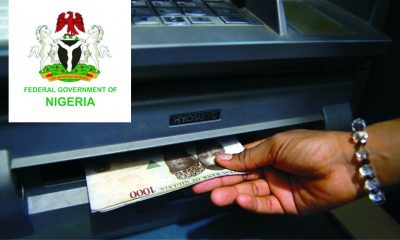
 Featured5 days ago
Featured5 days agoCBN Retains N100 ATM Fee For Withdrawal Below N20,000
-
Politics5 days ago
Rivers Assembly Tasks LGAs On Youth Restiveness …Confirms Assembly, LG Service Commissions
-
Nation5 days ago
I Was Never Suspended As LP Chairman-Dokubo
-
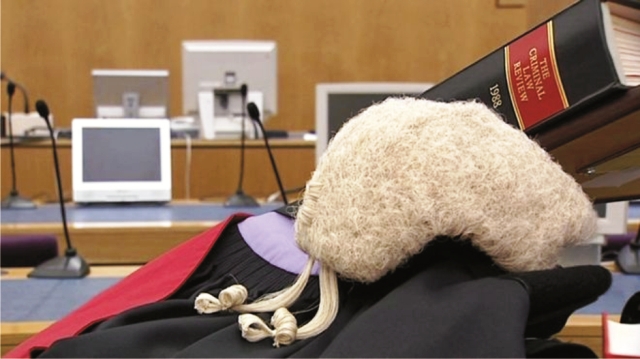
 News5 days ago
News5 days agoECOWAS Court Orders Nigeria to Pay N52m compensation to Rivers, Lagos Evictees

